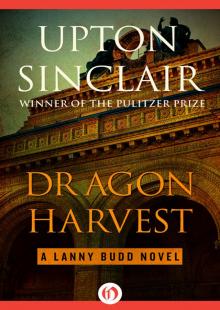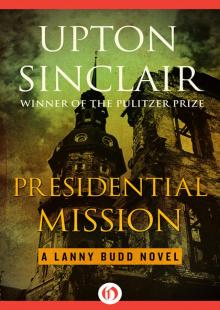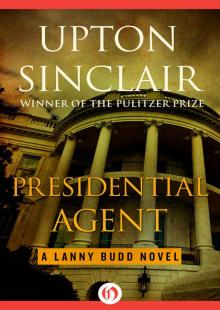- Home
- Upton Sinclair
Wide Is the Gate Page 17
Wide Is the Gate Read online
Page 17
“Sehr wohl, mein Herr.” They fell over themselves. Nothing so momentous had come their way in many a week. “Will der Herr nicht hinein kommen?”
“I’ll wait and stretch my legs,” said Lanny. “Heil Hitler!”
“Heil Hitler! Heil Hitler!” They didn’t even ask if he was taking out money or anything else that was verboten. They hurried inside, and never were documents inspected and stamped so promptly. Others came out to have a glimpse of the wonderful car and the wonderful Herr who only a few hours previously had been in the actual presence of the Godhead; not El Shaddai, the Terrible One, but the Teutonic Odin, God of the Furious Host. The documents were returned with bows, and Lanny took them and put them with slow dignity into an inside pocket; he stepped into his car, the barrier was raised, and he rolled into the Koningrijk der Nederlanden.
XII
In a comfortable room in the Hotel Amstel Lanny put in a midnight call for Eric Vivian Pomeroy-Nielson at The Reaches. He felt safe now—if the Gestapo hadn’t been interested to follow him in Berlin, they would hardly be doing it here. “Excuse me if I woke you up,” he said. “I’m in Amsterdam on picture business, and Irma is waiting in Paris. There’s something I need your advice about. Can’t you and Nina take the Harwich ferry tomorrow evening? I’ll meet you at the Hook in the morning and drive you to Paris and we’ll have a lark.”
“Well, I’ll be damned!” said the baronet’s son.
“I can’t explain it, but it’s important, and you’ll understand when I see you. Don’t say anything to Nina about it, just call it a holiday and let me pay the bills—it’ll be worth it many times over to me. If she can’t come, you get somebody to motor you to Harwich and let me pay for that.”
“You must have sold some big pictures, old top! It’s a date!”
Lanny called his wife and told her of this arrangement. She said: “Oh, goody!” and felt no surprise because people jumped here and there in search of pleasure. She herself had just got back from a theater party with Denis de Bruyne. Lanny said: “Furtwaengler sent his love—I believe you have made a conquest.” He laughed, because he could imagine the moue she would be making. She regarded the Nazi staff officer as what the Germans call an Emporkommling, a “little upcomer.”
Lanny had the two paintings brought to his room with him and now he took off the back of one and spent a good part of the night studying the photographs—twenty-four sheets, carefully selected. He thought: “If this doesn’t wake up the British and French, they’ll deserve what is coming to them.” He thought of the model airplane factory his father was planning, and had an impulse to go and help. But no, what he was doing was better. Set up a big alarm bell and start it ringing!
He slept with the documents half under him, and in the morning he borrowed a needle and thread from the chambermaid—having a hard time persuading her not to do the work for him! He sewed the documents in several parts of his coat-lining, and then, feeling like a padded Chinese, he had his paintings carried down into the hotel basement and separately crated by the porter. He took them to the express office and shipped them, duly covered by insurance; after which he went for a walk in this fine old city of frozen canals and snow-covered trees.
In the Ryks Museum the kindly authorities had provided comfortable plush-covered benches upon which an art expert could sit for hours and study the fine points of several of the world’s great masterpieces. During his lifetime the creator of these works had been treated none too well; he had died bankrupt and miserable, but now he was honored, and his finest works were placed in separate rooms with ample space and perfect lighting. Amid reverent silence Lanny could lose himself in a time three hundred years gone, imagining himself in conversation with the five “Syndics,” members of the Clothmakers’ Company. This association had made good cloth and from it their tailors had made good clothing; the five gentlemen had put on their best, and their wives had seen to it that all the accessories were right, while an eccentric genius named Rembrandt van Rijn was immortalizing their features and figures. They looked out at Lanny with such life that he was prepared to have them speak, and was sure it would be a worthwhile conversation; for they were obviously cultivated gentlemen, who knew how to make use of their wealth and whose ideas were by no means limited to the quality and prices of cloth.
In an adjoining and much larger room the visitor renewed his acquaintance with a great canvas, covering an entire wall, The Sortie, sometimes known as The Night-Watch although it appears that the sun is streaming onto some of the accouterments and colored raiment of the watchmen. It is the painting which ruined poor Rembrandt, because the gentlemen who had ordered it wanted a portrait gallery, with each of their faces given equal prominence, whereas the bold painter had presumed to compose a scene. They were marching out to repel invaders; and Lanny had a hard time keeping his attention on the fine points of the art of applying paint to canvas, because he was thinking about the position of a small and civilized country lying alongside a powerful one which was rapidly sliding back into barbarism. He wanted to cry out to all the polite and friendly Dutch people whom he saw in this museum: “Keep your night-watch, and your day-watch, too, because the Nazis are making surveyor’s maps of all your bombing objectives! Do not give too much thought to splendid uniforms or other such details, because you may have to dig down into your everlasting mud to hide from bombs and grenades and flame-throwers and poison gas!”
XIII
Nina and Rick arrived, and Lanny bundled them up and drove them to Paris in time for lunch. Afterward the two ladies discussed their affairs in Irma’s room, while Lanny took his chum into his own and told him what it was that made his coat fit badly. After Rick had got over his amazement he said: “It’s ghastly, Lanny, but I doubt if we British will really do anything about it, because our governing class can’t make up their minds whether Hitler is good or bad—in other words, whether he intends to march east or west.”
“Good God!” exclaimed the American. “If he’s going east what does he want with surveys of London and Paris?”
“Oh, well, they’re all getting such data—that is, unless they’re too lazy, as I rather think we are just now.”
Rick agreed that the only hope was to use the documents to stir up the public. An active journalist didn’t have to be told what an explosion they would make, and he offered to take them straight to a liberal editor whom he knew and who would give them ample space and advertising. But Lanny said: “You’ve contributed to that paper, so you will be one of the first persons the Nazis will set out to trail. They will find out that you came to Amsterdam right after I left Germany; and they may even find us registered at this hotel.”
“Whoo-ee!” said the Englishman.
“I’ve given a lot of thought to the job, and it’s far from easy. You can’t imagine what efforts Goring will make to trace this thing down; he’ll stand the whole Gestapo on its head. If anything turns attention to me, they’ll watch me the next time I come into Germany, and get every person who meets me.”
“Right you are, son.”
“These documents have to be published by some paper with which neither of us has ever had anything to do; a paper without any left tendencies, so that Goring will decide that the job was done by respectable government spies.”
“That will need some thinking,” declared Rick. “The Times has gone over to the pro-Hitler clique and the Daily Mail is practically a Fascist organ.” He went on to canvass the other papers, and finally chose one which he said was completely reactionary, interested in rearmament from the point of view of British Empire security. “Too bad to promote its circulation, but that can’t be helped. Hitler’s going to make strange bed-fellows in all the nations around him!”
Said Lanny: “The documents ought to be taken to the paper, not by you but by somebody who is pledged never to mention where he got hold of them.”
That also called for thinking. They discussed public men whom they knew, whether personally or by reputation, to find
one who was honest, at least to the extent of being for England more than for himself. In the end Rick’s choice fell upon a member of Parliament whom “the pater” knew slightly; one of those Englishmen who manage to combine Church of England piety with capitalist-class politics and the construction of bigger and better dreadnoughts. Rick would seek a private interview with this statesman, vouch for the genuineness of the documents, and pledge him to deliver them to the newspaper publisher without any hint as to how they had reached England.
“By the way,” said Lanny, “I’m not saying anything to Irma about all this, and it might be just as well not to tell Nina.”
“More than that,” countered his friend, looking him in the eyes. “Neither of us is going to say one word about this—ever. Shake hands on it and mean it!”
8
THE DUSKY CLOUDS ASCENDING
I
There were three comfortable dwellings on the Bienvenu estate, the Villa, the Lodge, and the Cottage—the first being the home of the Dingles, the second of Lanny and Irma, and the third of Nina and Rick or other friends when they were free to come. Also there were two small structures known as studios, one having been built for Marcel and one for Kurt in the old days. Marcel’s studio was now occupied by Lanny, his books, piano, and music, while the other was for Hansi and Bess when they came, and otherwise for any noisemaker or other eccentric person whom it was thought wise to segregate. Lanny was always coming upon someone who claimed to have genius, and Irma had been told that it was a distinguished thing to have such persons on the place—only she begged that they wouldn’t be Reds or Pinks, because they brought such undesirable company. Since Lanny was trying to avoid displeasing not merely his wife but also a fat Nazi general and his secret police, he made a practice of meeting his off-color friends at some obscure lunching-place in the city of Cannes.
Bienvenu was an extremely humble affair according to Barnes family standards, but Irma put up with it for the sake of love and the climate. The main trouble was, there was no room for entertaining on what she considered an adequate scale, and outdoor affairs were subject to the whims of the weather. The problem was solved by a combination with Emily Chattersworth, who had two fine drawing-rooms at Sept Chenes, her Riviera home, big enough for dancing. Emily was no longer equal to the task of entertaining, yet she couldn’t bear to give up her friends or to neglect to make use of a celebrity when one came along. So Irma would come up and act as hostess, with the older woman to advise her. After some argument Irma had gained the right to pay for the “talent,” also for the food and drink. Emily’s staff of well-trained servants would do the work, and the utility king’s daughter would watch and learn every detail of the subtle duties of a salonniere. That was the career she had chosen, and the experience would be equally useful whether she decided to apply it in Paris, London, or New York.
So a season passed pleasantly enough. Visitors came back to the Riviera, and costumes and jewels and titles were flaunted. Prosperity appeared to be reviving after a long financial drought. Franklin D. Roosevelt had been President of the United States for two years, and while the Supreme Court had thrown out some of his schemes, the general idea of free spending was coming to be accepted, even by those who scolded at it. The device enabled people to live, and after the fright they had had, that was enough. The masses got money from the government and spent it in grocery and clothing stores, and these in turn bought from the wholesalers, and these from the manufacturers; so it went, all the way down the line, and bonds which Irma owned began to draw interest and stocks to earn dividends. Each quarter her income was a bit larger, and all this reinforced her own firm conviction that money was made to be spent.
People gathered around, eager to help her spend it, and she was generous because that was so much the easiest way; she didn’t want glum or anxious faces anywhere in sight, and would put money in the bank to Beauty’s account and to Lanny’s, and if she found them trying to economize she would say: “What’s the big idea?” Living with or near the daughter of J. Paramount Barnes was like being on board one of those old-fashioned, full-rigged clipper ships with every sail set—a wet sheet and a flowing sea, a wind that follows fast, and fills the white and rustling sails and bends the gallant mast!
II
The Saarland plebiscite was held in January, and resulted in a nine-to-one vote by the inhabitants in favor of a return to Germany. The district had always been German, and doubtless would have voted that way without the colossal propaganda campaign which the Nazis had put on. But the Nazis liked such campaigns, they were the breath of Nazi being, and they were practice for other campaigns which were scheduled for everywhere along the German borders. They included not merely speeches and music and marching, but also the boycotting of merchants and the terrorizing of opponents by brownshirted rowdies of the Deutsche Front, armed with revolvers, daggers, and hard-rubber truncheons.
As soon as the election results were announced, the Nazis prepared their “long knives,” and so most of the French population picked up what belongings they could carry and fled. Many came to the Riviera, because it was warmer and therefore a more pleasant place in which to starve. Many were of leftist tendency, and they hadn’t been starving for long before they heard about that extraordinary American family with a son and heir who had a tender heart and who was simply rolling in money, being married to one of the greatest heiresses in the world. So came numbers of begging letters in the Bienvenu mail, and many of them were heart-rending. Visitors came to the gates, and when they were told that the young master was not at home they would go away and put their wits to work on some method of getting hold of him.
There had been a sort of amateur secret service at work on the Budd Family, and all the Reds and Pinks knew exactly the situation. The mother was a butterfly and a good deal of a fool, while the wife was reactionary, even Fascist in her sympathies; these two guarded the place like dragons and told all the servants not to let strangers past the gates. The time to catch Lanny was when he came to town; then if you pounced on him and told him a hard-luck story, he couldn’t say No. Another method of contact was through Raoul Palma, director of the Ecole des Travailleurs du Midi; so it came about that new persons joined the school and asked for jobs as teachers, with salaries however small. Lanny would give money to his Spanish friend, but always under the condition: “Do me the favor to pretend that you got it somewhere else.”
III
There came a letter from Rick, saying: “I have seen the gentleman whom I hope to interest in your pictures, and I think the deal will go through.” Then a second note: “The picture deal is O.K., and I believe you will be satisfied.” A week or so later the documents were published, in installments, day after day, and there was a tremendous sensation; the baronet’s son wrote about it freely, as he would have done if he had known nothing about the matter in advance. There were interpellations in Parliament, and vague answers to the effect that the government were taking cognizance—the English government were always plural, and also they were dignified, imperturbable, and slow to anger when they wanted to be. There was a new term coming into use for statesmen and officials who avoided getting angry with the Nazis; they were called “appeasers,” and the Nazis quickly found out who they were and made the most of their state of mind. Jesse Blackless had pointed out to his nephew the fact that those who were most afraid of displeasing the Nazis appeared to be least afraid of displeasing the Soviets.
Lanny got copies of the London papers, and clipped them and sent them to his father. “This looks to be genuine,” he wrote, “and ought to help sell your products when you get them ready.” Robbie replied: “Hot stuff, and if I thought it was genuine I’d send Johannes over now! Send me anything more of the sort that you come upon. Also, ask your fat friend about it the next time you see him!”
Ramsay MacDonald, still holding on as Prime Minister, made a speech protesting against German rearmament. Ramsay made speeches about many evils, and assumed that this was equivalen
t to abolishing them. Hitler made a speech in reply, telling how pacific were the intentions of his government; and all the appeasers said: “There, now, you see how he is being maligned!” Wickthorpe told Rick that Downing Street—the British Foreign Office—had made strong representations to the Wilhelmstrasse, and the Wilhelmstrasse had promptly denounced the documents as fraudulent. His Lordship added that he was inclined to accept this, and Rick was not in a position to dissent. Among other things Rick sent to Lanny was a clipping from a Left paper of London which said that, if the truth ever became known about these revelations, it would be found that aircraft manufacturers outside of Germany had had a hand in the preparation of them. Rick put some exclamation points in the margin of this, and Lanny Budd, son of an embryo aircraft manufacturer, didn’t fail to appreciate the humor.
Also, there came one of those plain-looking missives from Berlin. “Mueller” expressed her gratitude for his wise use of her sketches, and promised to make some more. Lanny knew that the circulation of English newspapers was still permitted in Germany, and while those particularly dangerous issues had doubtless been confiscated, the details would be known to both the Nazis and their foes. In the midst of the darkness of intrigue that covered Europe, you cast your bread upon the waters—such small crumbs of truth as you could collect—and wondered if the Preacher had been right and would you ever find them again, and where, and when, and how.
IV
There was a diplomatic chess-game being played, with the continent of Europe as the board; a new and immensely complicated kind of chess in which the pieces, instead of being lined up on opposite sides, had each his own color and played his own game. Each king, queen, knight, castle, even the smallest pawn, had his group of elder statesmen who put their heads together in anxious consultation, and after days and perhaps weeks of arguing they made a move; whereupon the whole aspect of the board was altered, and the statesmen of all the other pieces put their heads together and argued and agonized, until some group made a countermove, and at once the clamor of protest and the buzz of consultation started up afresh in all the other chess-chancelleries.

 Prince Hagen
Prince Hagen Dragon Harvest
Dragon Harvest The Jungle
The Jungle Sylvia's Marriage
Sylvia's Marriage Oil! A Novel by Upton Sinclair
Oil! A Novel by Upton Sinclair The Coal War: A Novel
The Coal War: A Novel Presidential Agent
Presidential Agent World's End
World's End The Second-Story Man
The Second-Story Man O Shepherd, Speak!
O Shepherd, Speak! Wide Is the Gate
Wide Is the Gate The Return of Lanny Budd
The Return of Lanny Budd One Clear Call I
One Clear Call I 100%: the Story of a Patriot
100%: the Story of a Patriot The Machine
The Machine Presidential Mission
Presidential Mission A Cadet's Honor: Mark Mallory's Heroism
A Cadet's Honor: Mark Mallory's Heroism Between Two Worlds
Between Two Worlds World's End (The Lanny Budd Novels)
World's End (The Lanny Budd Novels) Between Two Worlds (The Lanny Budd Novels)
Between Two Worlds (The Lanny Budd Novels) The Coal War
The Coal War Presidential Agent (The Lanny Budd Novels)
Presidential Agent (The Lanny Budd Novels) Oil (filmed as There Will Be Blood)
Oil (filmed as There Will Be Blood) Wide Is the Gate (The Lanny Budd Novels)
Wide Is the Gate (The Lanny Budd Novels)